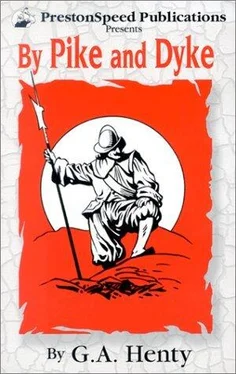G.A. Henty - By Pike and Dyke - A Tale of the Rise of the Dutch Republic
Здесь есть возможность читать онлайн «G.A. Henty - By Pike and Dyke - A Tale of the Rise of the Dutch Republic» весь текст электронной книги совершенно бесплатно (целиком полную версию без сокращений). В некоторых случаях можно слушать аудио, скачать через торрент в формате fb2 и присутствует краткое содержание. Жанр: Старинная литература, на английском языке. Описание произведения, (предисловие) а так же отзывы посетителей доступны на портале библиотеки ЛибКат.
- Название:By Pike and Dyke: A Tale of the Rise of the Dutch Republic
- Автор:
- Жанр:
- Год:неизвестен
- ISBN:нет данных
- Рейтинг книги:5 / 5. Голосов: 1
-
Избранное:Добавить в избранное
- Отзывы:
-
Ваша оценка:
- 100
- 1
- 2
- 3
- 4
- 5
By Pike and Dyke: A Tale of the Rise of the Dutch Republic: краткое содержание, описание и аннотация
Предлагаем к чтению аннотацию, описание, краткое содержание или предисловие (зависит от того, что написал сам автор книги «By Pike and Dyke: A Tale of the Rise of the Dutch Republic»). Если вы не нашли необходимую информацию о книге — напишите в комментариях, мы постараемся отыскать её.
By Pike and Dyke: A Tale of the Rise of the Dutch Republic — читать онлайн бесплатно полную книгу (весь текст) целиком
Ниже представлен текст книги, разбитый по страницам. Система сохранения места последней прочитанной страницы, позволяет с удобством читать онлайн бесплатно книгу «By Pike and Dyke: A Tale of the Rise of the Dutch Republic», без необходимости каждый раз заново искать на чём Вы остановились. Поставьте закладку, и сможете в любой момент перейти на страницу, на которой закончили чтение.
Интервал:
Закладка:
The Spanish fury, as the sack of Antwerp was termed, vastly enriched the soldiers, but did small benefit to the cause of Spain. The attack was wanton and unprovoked. Antwerp had not risen in rebellion against Philip, but had been attacked solely for the sake of plunder; and all Europe was shocked at the atrocities that had taken place, and at the slaughter, which was even greater than the massacre in Paris on the eve of St. Bartholomew. The queen remonstrated in indignant terms, the feeling among the Protestants in Germany was equally strong, and even in France public feeling condemned the act.
In the Netherlands the feeling of horror and indignation was universal. The fate that had befallen Antwerp might be that of any other sister city. Everywhere petitions were signed in favour of the unity of all the Netherlands under the Prince of Orange. Philip's new governor, Don John, had reached the Netherlands on the very day of the sack of Antwerp, and endeavoured to allay the storm of indignation it had excited by various concessions; but the feeling of unity, and with it of strength, had grown so rapidly that the demands of the commissioners advanced in due proportion, and they insisted upon nothing less than the restoration of their ancient constitution, the right to manage their internal affairs, and the departure of all the Spanish troops from the country.
Don John parleyed and parried the demands, and months were spent in unprofitable discussions, while all the time he was working secretly among the nobles of Brabant and Flanders, who were little disposed to see with complacency the triumph of the democracy of the towns and the establishment of religious toleration. Upon all other points Don John and his master were ready to yield. The Spanish troops were sent away to Italy, the Germans only being retained. The constitutional rights would all have been conceded, but on the question of religious tolerance Philip stood firm. At last, seeing that no agreement would ever be arrived at, both parties prepared again for war.
The Queen of England had lent 100,000 pounds on the security of the cities, and the pause in hostilities during the negotiations had not been altogether wasted in Holland. There had been a municipal insurrection in Amsterdam; the magistrates devoted to Philip had been driven out, and to the great delight of Holland, Amsterdam, its capital, that had long been a stronghold of the enemy, a gate through which he could at will pour his forces, was restored to it. In Antwerp, and several other of the cities of Brabant and Flanders, the citizens razed the citadels by which they had been overawed; men, women, and children uniting in the work, tearing down and carrying away the stones of the fortress, that had worked them such evil.
Antwerp had at the departure of the Spanish troops been again garrisoned by Germans, who had remained inactive during this exhibition of the popular will. The Prince of Orange himself had paid a visit to the city, and had, at the invitation of Brussels, proceeded there, and had received an enthusiastic reception, and for a time it seemed that the plans for which so many years he had struggled were at last to be crowned with success. But his hopes were frustrated by the treachery of the nobles and the cowardice of the army the patriots had engaged in their service.
Many of the Spanish troops had been secretly brought back again, and Don John was preparing for a renewal of war.
Unknown to the Prince of Orange, numbers of the nobles had invited the Archduke Mathias, brother of the Emperor Rudolph of Germany, to assume the government. Mathias, without consultation with his brother, accepted the invitation and journeyed privately to the Netherlands. Had the Prince of Orange declared against him he must at once have returned to Vienna, but this would have aroused the anger of the emperor and the whole of Germany. Had the prince upon the other hand abandoned the field and retired into Holland, he would have played into the hands of his adversaries. Accordingly he received Mathias at Antwerp with great state, and the archduke was well satisfied to place himself in the hands of the most powerful man in the country.
The prince's position was greatly strengthened by the queen instructing her ministers to inform the envoy of the Netherlands that she would feel compelled to withdraw all succour of the states if the Prince of Orange was deprived of his leadership, as it was upon him alone that she relied for success. The prince was thereupon appointed Ruward of Brabant, a position almost analogous to that of dictator. Ghent, which was second only in importance to Antwerp, rose almost immediately, turned out the Catholic authorities, and declared in favour of the prince. A new act of union was signed at Brussels, and the Estates General passed a resolution declaring Don John to be no longer governor or stadtholder of the Netherlands. The Prince of Orange was appointed lieutenant general for Mathias, and the actual power of the latter was reduced to a nullity, but he was installed at Brussels with the greatest pomp and ceremony.
Don John, who had by this time collected an army of 20,000 veterans at Namur, and had been joined by the Prince of Parma, a general of great vigour and ability, now marched against the army of the Estates, of which the command had been given to the nobles of the country in the hope of binding them firmly to the national cause.
The patriot army fell back before that of the Spaniards, but were soon engaged by a small body of cavalry. Alexander of Parma came up with some 1200 horse, dashed boldly across a dangerous swamp, and fell upon their flank. The Estates cavalry at once turned and fled, and Parma then fell upon the infantry, and in the course of an hour not only defeated but almost exterminated them, from 7000 to 8000 being killed, and 600 taken prisoners, the latter being executed without mercy by Don John. The loss of the Spaniards was only about ten men. This extraordinary disproportion of numbers, and the fact that 1200 men so easily defeated a force ten times more numerous, completely dashed to the ground the hopes of the Netherlands, and showed how utterly incapable were its soldiers of contending in the field with the veterans of Spain.
The battle was followed by the rapid reduction of a large number of towns, most of which surrendered without resistance as soon as the Spanish troops approached. In the meantime the Estates had assembled another army, which was joined by one composed of 12,000 Germans under Duke Casimir. Both armies were rendered inactive by want of funds, and the situation was complicated by the entry of the Duke of Alencon, the brother of the King of France, into the Netherlands. Don John, the hero of the battle of Lepanto, who had shown himself on many battlefields to be at once a great commander and a valiant soldier, was prostrate by disease, brought on by vexation, partly at the difficulties he had met with since his arrival in the Netherlands, partly at the neglect of Spain to furnish him with money with which he could set his army, now numbering 30,000, in motion, and sweep aside all resistance. At this critical moment his malady increased, and after a week's illness he expired, just two years after his arrival in the Netherlands.
He was succeeded at first temporarily and afterwards permanently by Alexander of Parma, also a great commander, and possessing far greater resolution than his unfortunate predecessor.
The two years had been spent by Edward Martin in almost incessant journeyings between London and the Netherlands. He now held, however, a position much superior to that which he had formerly occupied. The queen, after hearing from him his account of the sack of Antwerp and his share in the struggle, had said to the Secretary, “I think that it is only just that we should bestow upon Captain Martin some signal mark of our approbation at the manner in which he has for two years devoted himself to our service, and that without pay or reward, but solely from his loyalty to our person, and from his goodwill towards the state. Kneel, Captain Martin.”
Читать дальшеИнтервал:
Закладка:
Похожие книги на «By Pike and Dyke: A Tale of the Rise of the Dutch Republic»
Представляем Вашему вниманию похожие книги на «By Pike and Dyke: A Tale of the Rise of the Dutch Republic» списком для выбора. Мы отобрали схожую по названию и смыслу литературу в надежде предоставить читателям больше вариантов отыскать новые, интересные, ещё непрочитанные произведения.
Обсуждение, отзывы о книге «By Pike and Dyke: A Tale of the Rise of the Dutch Republic» и просто собственные мнения читателей. Оставьте ваши комментарии, напишите, что Вы думаете о произведении, его смысле или главных героях. Укажите что конкретно понравилось, а что нет, и почему Вы так считаете.












